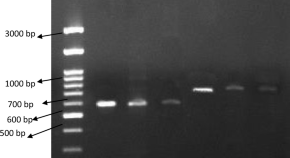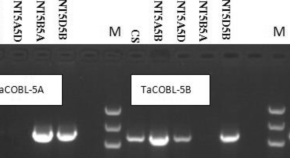Genome-wide identification and gene expression analysis of GHMP kinase gene family in banana cv. Rasthali
Authors (first, second and last of 5)

Collection
Crop production and productivity are challenged by a variety of biotic and abiotic stresses. Among the biotic stresses, viruses, bacteria, fungi, nematodes, insects, arachnids and weeds are major biotic factors causing huge yield losses and sometimes death of plants. Similarly, different abiotic stresses including extreme temperatures, drought, water logging, salinity, heavy metals, mineral toxicity, etc. also affect crop production. In the near future the problems caused by these biotic and abiotic stresses are expected to increase. Therefore, there is an urgent need to address the issue and efforts need to be made to develop biotic and abiotic stress resistant/tolerant crop varieties to ensure food security and safety in the coming years. Several genomics approaches have been used to understand the complex nature of both biotic and abiotic stress responses. The important genes/QTLs/transcripts/markers identified for biotic and abiotic stress tolerance will prove useful for molecular breeding programs leading to the development of next-generation crop varieties.
The Topical Collection “Genomics Approaches for Improving Biotic and Abiotic Stress tolerance in Crop Plants” covers, amongst others, the following topics:
Development of molecular markers for biotic and abiotic stress tolerance
Development of genetic resources (map** populations, core collections, mini-core collections, etc)
Gene discovery for biotic and abiotic stress tolerance through different approaches including QTL interval map**, GWAS and transcriptomics approaches
Next-generation sequencing tools and technologies
Molecular breeding involving MAS, MARS, GWS/GS and gene pyramiding
Trait evaluation for biotic and abiotic stress tolerance and related traits
Evaluation of traits (morphological, biochemical, physiological and metabolomic traits) induced by biotic and abiotic stresses
Genetic transformation/genome editing to develop improed cultivars
Dr. Mir, Associate Professor in the Div. of Genetics and Plant Breeding at Sher-e-Kashmir University of Agricultural Sciences and Technology of Kashmir (SKUAST-K) has a longstanding engagement in research in Applied Genomics of Jute, wheat, and legume crops. He worked with several national and international institutes/universities like ICRISAT-Hyderabad, India, University of California at Davis, California, USA, Ch. Charan Singh University, Meerut, SKUAST-Jammu etc. He is currently involved in gene discovery programs for a variety of important traits in crop plants.
Dr. Rustgi is an Associate Professor of Molecular Breeding at the Department of Plant and Environmental Sciences, Clemson University, and Faculty Scholar at the Clemson University School of Health Research, as well as an Adjunct Associate Professor at the Department of Crop and Soil Sciences, Washington State University, Pullman. His research primarily focuses on develo** dietary therapies for individuals with celiac disease or allergies to wheat or peanut, develo** biomarkers for heat stress tolerance in soybean and peanuts, and strategies to mitigate the major insect pests or fungal pathogens of the primary South Carolina crops.
Dr. Pandey is a Principal Scientist-Genomics, Prebreeding & Bioinformatics at ICRISAT, Hyderabad-India, Adjunct Associate Professor in the USQ, Australia; Distinguished Professor in the Inst. of Crop Genetic Resources of SAAS, China; and Minjiang Scholar Lecturer Professor in Fujian Agriculture and Forestry Univ., China. His key contributions include reference genome sequence for diploid progenitor and both the subspecies of cultivated tetraploid groundnut, gene expression atlas, low to high density SNP genoty** assays, diagnostic markers for key traits, quality control panel, marker-assisted pyramiding and genomic selection in groundnut.
Dr. Kumar, Assistant Prof. in the Dept. of Mol. Biology & Biotechnology at CCS HAU, Hisar, India, has research experience in Functional Genomics and Crop Biotechnology and a longstanding engagement in research in Crop Biofortification, Genome Editing through CRISPR/Cas9 and the development of transgenic crops for biotic and abiotic stress tolerance. He worked with institutes and universities like the University of G.B. Pant Univ. of Agriculture & Technology, Pantnagar, India, Indian Inst. of Maize Research, New Delhi, India, Ch. Charan Singh Univ., Meerut, India. Presently, he is working in collaboration with UMass/Amherst, Massachusetts, USA


























